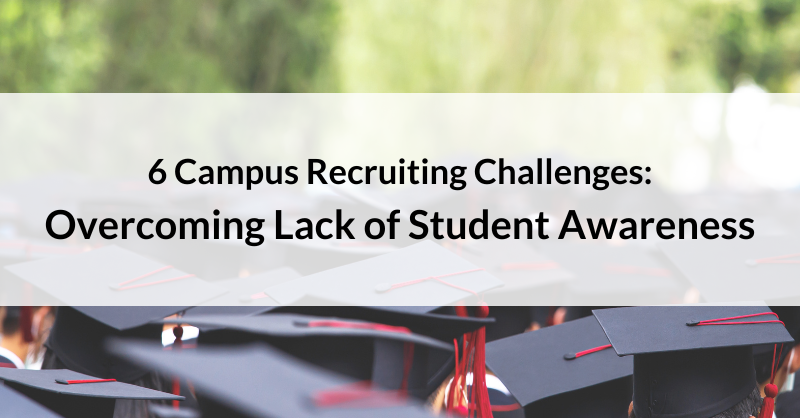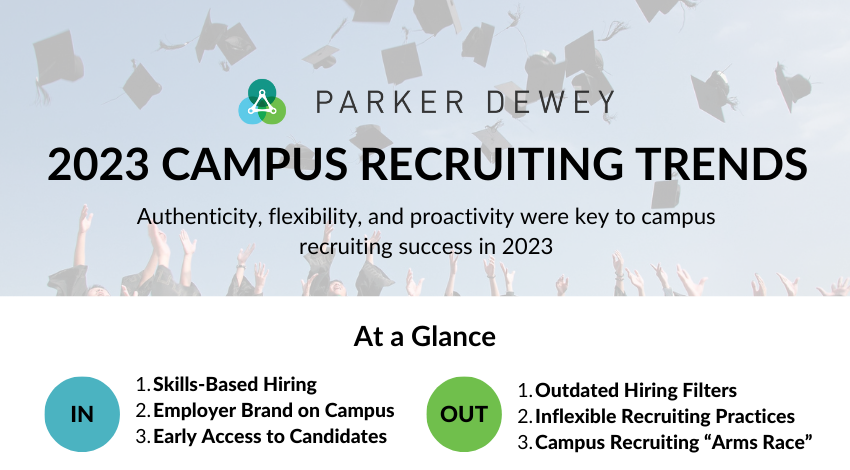
Overcoming Lack of Student Awareness
In this series, we’re covering six of the most pressing challenges facing campus recruiters right now. Stay tuned as we release a new post each week! Access the full eBook here.
In a sea of technology giants, startups, and big-name brands, it can be challenging for employers—especially ones that are not widely recognized—to stand out to college students. While so many of these companies have no shortage of early-career opportunities, they often struggle to attract the attention of talented career launchers—whether the reason is lack of brand awareness or preconceived notions held by students. If you’re a campus recruiter looking for strategies to overcome this challenge, read on! Access the full eBook here.
Why are students unaware of certain employers?
The dominance of well-known companies: Large multinational corporations often possess brand recognition and a well-established reputation. Students tend to gravitate towards these companies due to familiarity, perceived stability, and prestigious associations. Consequently, lesser-known organizations find it challenging to attract the attention of students, making recruitment efforts more difficult.
Limited exposure: One of the main reasons behind students' lack of awareness about lesser-known companies is limited exposure. Campus recruiters often struggle to reach out to students effectively, especially when they have a modest recruitment budget and less visibility compared to larger firms. Consequently, students miss out on opportunities with innovative and promising organizations that may offer unique learning experiences and growth potential.
Preconceived notions and biases: College students often hold preconceived notions of what works at a specific company entails, what opportunities are available, and which roles might interest them. For example, a student might not know the breadth of innovation and opportunities available at a steel manufacturing company or within the banking industry. This bias prevents students from exploring alternative options and potentially missing out on hidden gems within the job market.
Lack of hands-on experiences: College students don’t know what they don’t know! Students often rely on conventional sources like career fairs, company presentations, and online job portals to gather information about potential employers. While these can be useful points of reference, they don’t really give candidates a true feel for your organization. And what’s more, some companies may not have the resources to actively participate in such events or showcase their opportunities effectively.
How Micro-Internships solve the lack of student awareness challenge
Strengthening campus outreach programs: With Micro-Internships, employers can partner with faculty to turn coursework into a paid project. This approach gets your brand in front of students, while creating the opportunity to build real relationships with potential candidates. Leading CRM platform HubSpot is one example of a company that leverages this strategy, partnering with HBCUs to engage students on actual projects that complement their coursework and classroom experience. This approach allows hiring managers to interact with students directly, fostering awareness and piquing their curiosity about lesser-known organizations.
Leveraging digital platforms: Students get countless emails and an endless flow of social media scrolling—so how can companies make themselves known and stand out? With access to 11 million degree earners nationwide, posting a project on the Parker Dewey platform is a great way to get eyes on your organization. Offering a paid, real opportunity to learn about a company also helps employers stand out from the crowd and showcases a dedication to innovation—and in fact, 95% of students want to connect through hands-on experiences!
Collaborating with university career services and alumni: Building strong partnerships with university career services can prove beneficial for both campus recruiters and students. For example, Swarthmore College’s SwatWorks Micro-Internship program focuses on connecting alumni, parents and others associated with the college through short-term projects during students’ academic breaks. This program’s popularity has created such value for all stakeholders that Swarthmore continues to add resources to expand it further. For alumni, many are enjoying the tremendous value of the Micro-Interns’ support that they are self-funding additional projects year round.
Showcasing success stories: Sharing success stories of previous recruits who have thrived in lesser-known companies can inspire and motivate students. Alumni networks, testimonials, and case studies can effectively demonstrate the opportunities for growth and development that may be available outside the realm of well-known corporations. Another strategy that’s proven successful for organizations like Trane Technologies is the use of campus ambassador programs to help spread awareness of on-campus events.
Micro-Internships help bridge the gap between students and lesser-known companies. By offering paid, bite-sized experiences, recruiters can provide students with hands-on exposure to the organization's work, culture, and potential career paths. Micro-Internships allow students to explore various companies, gaining valuable skills, building their resumes, and expanding their professional network. Through these experiences, students can discover the hidden gems and untapped potential of organizations.
Interested in learning more about how Micro-Internships offer a valuable complement to the traditional internship program? Schedule a call with our team.




